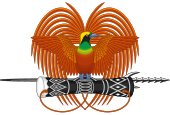 |
|---|
General elections were held in Papua and New Guinea on 27 August 1960. [1]
 |
|---|
General elections were held in Papua and New Guinea on 27 August 1960. [1]
The 29-member Legislative Council consisted of the Administrator, 16 civil servants, nine members appointed by the Administrator (three representatives of the indigenous population, three representing European settlers and three representing missionaries) and three elected Europeans. [2] [3] The Chinese community were also given the right to vote alongside Europeans. [4]
The three elected members were elected from three single-member constituencies, New Guinea Islands, New Guinea Mainland and Papua by preferential voting. [5]
Two of the three seats were uncontested, with Craig Kirke, a Port Moresby solicitor and anti-income tax activist running unopposed in Papua and former MLC Don Barrett, a planter, the sole candidate in New Guinea Islands. [6] The New Guinea Mainland seat was contested by former MLC Sydney Barker (a dentist and miner from Wau), Paul Hymna (an accountant from Lae), Lloyd Hurrell (a farmer in Wau) and Keith Watkins (a trader from Lae).
In the sole contested constituency, voter turnout was around 38%. [1]
| Constituency | Candidate | Votes | % | Notes |
|---|---|---|---|---|
| New Guinea Islands | Don Barrett | Unopposed | Elected | |
| New Guinea Mainland | Lloyd Hurrell | 304 | Elected | |
| Paul Hyman | 109 | |||
| Sydney Barker | ||||
| Keith Watkins | ||||
| Papua | Craig Kirke | Unopposed | Elected | |
| Invalid/blank votes | – | |||
| Total | ||||
| Registered voters/turnout | 1,313 | |||
| Source: Pacific Islands Monthly | ||||
Reuben Taureka was appointed as an official member, replacing the Director of Native Affairs, becoming the first official indigenous member. [7]
| Position | Member | |
|---|---|---|
| Representatives of Europeans | Robert Bunting | |
| Basil Fairfax-Ross | ||
| John Hohnen | ||
| Representatives of Natives | Mahuru Rarua-Rarua | |
| Pita Simogun | ||
| John Vuia | ||
| Representatives of Missionaries | James Dwyer | |
| Philip Strong | ||
| David Eric Ure | ||